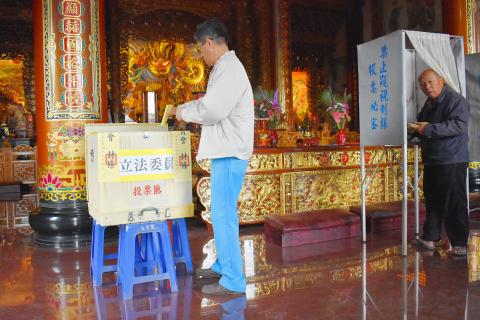The Democratic Progressive Party (DPP) yesterday retained two legislative seats, while the Chinese Nationalist Party (KMT) lost one of the two seats it previously held in legislative by-elections held in four cities and counties.
The DPP’s Yu Tian (余天) beat the KMT’s Cheng Shih-wei (鄭世維) and independent Su Ching-yen (蘇卿彥) in New Taipei City, and the DPP’s Kuo Kuo-wen (郭國文) defeated the KMT’s Hsieh Lung-chieh (謝龍介), as well as independent candidates Chen Hsiao-yu (陳筱諭), Wu Ping-hui (吳炳輝) and Hsu Kuo-tung (徐國棟), in Tainan.
In Changhua County, the KMT’s Ko Cheng-fang (柯呈枋) bested the DPP’s Huang Chen-yen (黃振彥), the New Power Party’s Yang Tse-min (楊澤民) and independent Chi Ching-tang (紀慶堂), while independent candidate Chen Yu-chen (陳玉珍) claimed victory in Kinmen County, defeating the KMT’s Hung Li-ping (洪麗萍) and independent candidates Chen Tsang-chiang (陳滄江), Tsai Hsi-hu (蔡西湖) and Lu Kuan-yu (盧冠宇), as well as the Kinmen Kaoliang Party’s Hung Chih-heng (洪志恆).

Photo: Yang Chin-cheng, Taipei Times
The by-elections were held to fill four seats vacated by lawmakers who won public posts in local elections in November last year or were stripped of their office by courts due to corruption.
Political observers had previously said that the by-elections would be a harbinger of next year’s presidential election.
The DPP and the KMT brought party heavyweights during campaigning, with President Tsai Ing-wen (蔡英文) and former premier William Lai (賴清德) lobbying for DPP candidates, and Kaohsiung Mayor Han Kuo-yu (韓國瑜) and former New Taipei City mayor Eric Chu (朱立倫) stumping for KMT candidates.
The KMT was hoping to ride the momentum it created in the local elections when it won a majority of the municipalities, while the DPP suffered a setback, the observers said.
The DPP, on the other hand, was hoping to make a comeback, they added.
At a post-election news conference at party headquarters in Taipei, DPP Secretary-General Luo Wen-jia (羅文嘉) said: “The DPP did not win — we just stopped the bleeding for now. While the outcome is encouraging, we are not calling for celebrations.”
The DPP would continue to build a coalition of individuals, organizations and parties with different ideals, but are united by a common cause, Luo said, before thanking Sunflower movement activist Lin Fei-fan (林飛帆) for stumping for Yu on Friday evening.
Asked whether the results suggested a weakening of the “Han wave,” a term that refers to Han’s reputation for energizing voters for other pan-blue political candidates, Luo said: “The only wave I care about is the democratic wave.”
KMT spokesman Ouyang Lung (歐陽龍) said that the KMT did not capture the three seats it targeted elsewhere, but held the line in Changhua County.
“Now is not the time for the KMT to be proud. We promise to the public that we will do everything in our power to nominate the best candidates for the presidency, vice presidency and lawmakers in the elections next year,” he said.
Additional reporting by Su Fun-her

‘FORM OF PROTEST’: The German Institute Taipei said it was ‘shocked’ to see Nazi symbolism used in connection with political aims as it condemned the incident Sung Chien-liang (宋建樑), who led efforts to recall Democratic Progressive Party (DPP) Legislator Lee Kun-cheng (李坤城), was released on bail of NT$80,000 yesterday amid an outcry over a Nazi armband he wore to questioning the night before. Sung arrived at the New Taipei City District Prosecutors’ Office for questioning in a recall petition forgery case on Tuesday night wearing a red armband bearing a swastika, carrying a copy of Adolf Hitler’s Mein Kampf and giving a Nazi salute. Sung left the building at 1:15am without the armband and apparently covering the book with a coat. This is a serious international scandal and Chinese

PERSONAL DATA: The implicated KMT members allegedly compiled their petitions by copying names from party lists without the consent of the people concerned Judicial authorities searched six locations yesterday and questioned six people, including one elderly Chinese Nationalist Party (KMT) member and five KMT Youth League associates, about alleged signature forgery and fraud relating to their recall efforts against two Democratic Progressive Party (DPP) legislators. After launching a probe into alleged signature forgery and related fraud in the KMT’s recall effort, prosecutors received a number of complaints, including about one petition that had 1,748 signatures of voters whose family members said they had already passed away, and also voters who said they did not approve the use of their name, Taipei Deputy Chief Prosecutor

UNDER ATTACK: Raymond Greene said there were 412 billion malicious threats in the Asia-Pacific region in the first half of 2023, with 55 percent targeting Taiwan Taiwan not only faces military intimidation from China, but is also on the front line of global cybersecurity threats, and it is taking action to counter those attacks, President William Lai (賴清德) said yesterday. Speaking at the opening of this year’s Cybersec Expo in Taipei, the president assured foreign diplomats and exhibitors that Taiwan remained committed to strengthening its defense against cyberattacks and enhancing the resilience of its digital infrastructure. Lai referenced a report from the National Security Bureau (NSB) indicating that the Government Service Network faced an average of 2.4 million intrusion attempts daily last year, more than double the figure

COUNTERINTELLIGENCE TRAINING: The ministry said 87.5 percent of the apprehended Chinese agents were reported by service members they tried to lure into becoming spies Taiwanese organized crime, illegal money lenders, temples and civic groups are complicit in Beijing’s infiltration of the armed forces, the Ministry of National Defense (MND) said in a report yesterday. Retired service members who had been turned to Beijing’s cause mainly relied on those channels to infiltrate the Taiwanese military, according to the report to be submitted to lawmakers ahead of tomorrow’s hearing on Chinese espionage in the military. Chinese intelligence typically used blackmail, Internet-based communications, bribery or debts to loan sharks to leverage active service personnel to do its bidding, it said. China’s main goals are to collect intelligence, and develop a